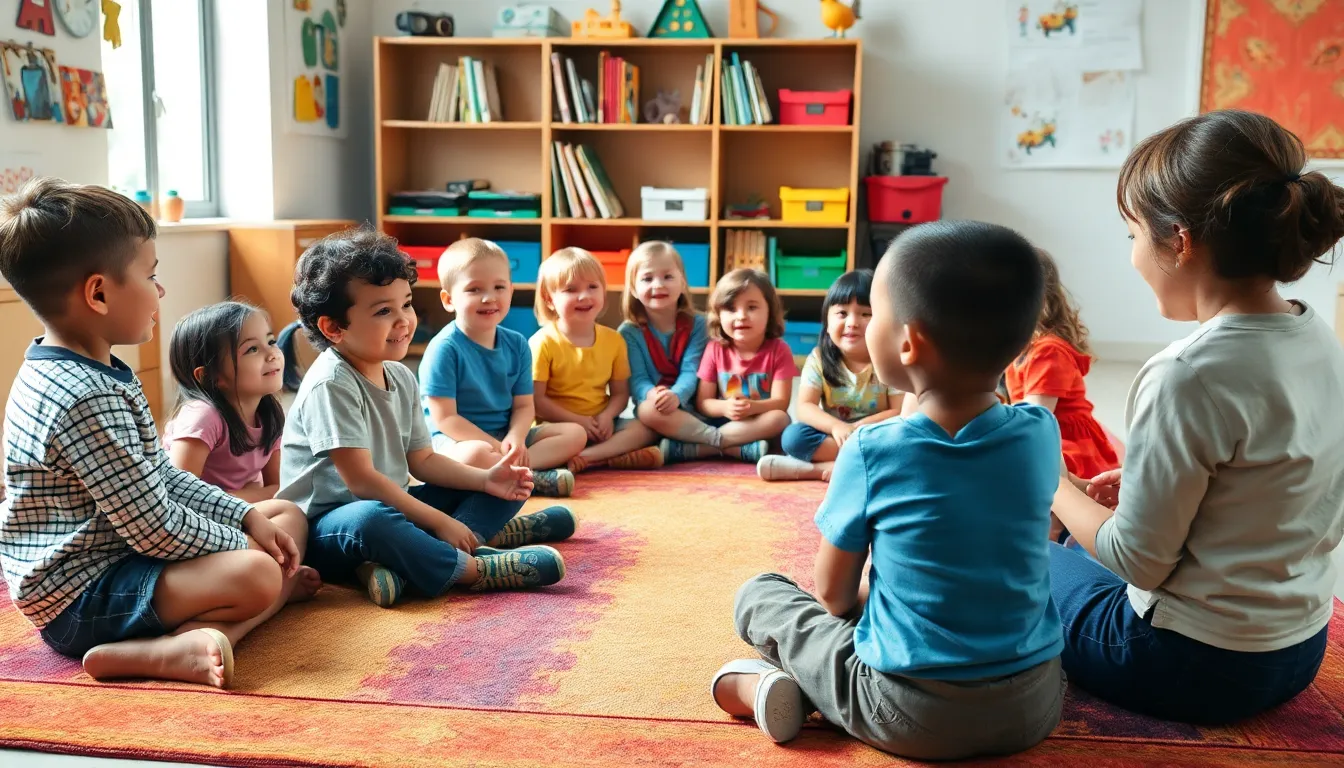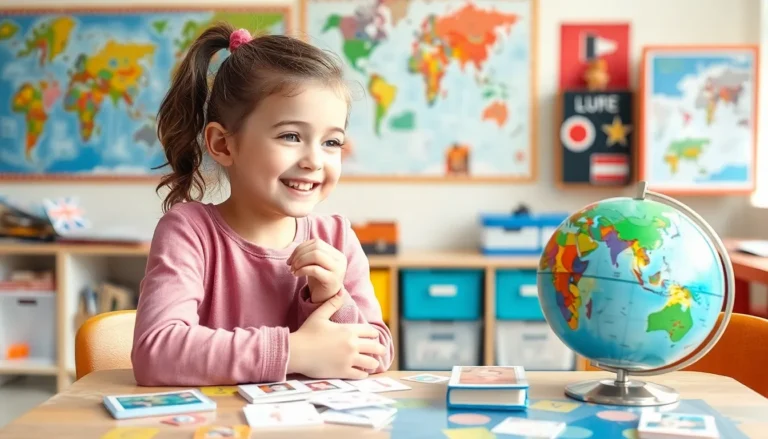In a world where toddlers can master technology faster than their parents, childhood language education has never been more crucial. Imagine a pint-sized genius stringing together sentences that could rival Shakespeare—okay, maybe not quite, but you get the idea. Early language skills set the stage for lifelong learning and communication, shaping little minds into articulate powerhouses.
But let’s face it: teaching kids to talk isn’t just about vocabulary and grammar. It’s about turning everyday moments into playful learning adventures. From singing silly songs to telling outrageous stories, the right approach can make language learning feel like a fun game rather than a chore. So, why not dive into the whimsical world of words and discover how to nurture your child’s linguistic journey? After all, who wouldn’t want to hear their little one impressing friends with their fancy new vocabulary?
Table of Contents
ToggleOverview Of Childhood Language Education
Childhood language education plays a crucial role in a child’s development. Early exposure to language supports cognitive growth, emotional well-being, and social skills. Research shows that children engaged in interactive language activities from a young age demonstrate better academic performance later on.
Effective methods emphasize playful learning. Activities such as singing, storytelling, and interactive play encourage children to explore language in fun ways. Parents and educators must create environments where children feel comfortable expressing themselves.
Resources like educational apps, books, and games serve as valuable tools. Using these resources helps reinforce language skills while keeping children engaged. Consistent practice strengthens their vocabulary and comprehension abilities.
Establishing rich language environments is essential. Conversations during daily routines offer organic opportunities for language growth. Asking open-ended questions fosters critical thinking and encourages children to elaborate on their thoughts.
Collaboration between parents and educators enhances language development. Sharing strategies allows for a more cohesive approach to learning. Regular communication about a child’s progress can pinpoint areas that need further support.
Monitoring milestones offers additional insight. Recognizing the typical speech and language development stages can help identify potential concerns early on. Interventions at the right time often lead to more successful outcomes in language skills.
Childhood language education serves as the foundation for lifelong learning. Prioritizing interactive and engaging methods ensures children develop into confident and articulate communicators.
Importance Of Early Language Development

Early language development significantly shapes a child’s ability to communicate effectively. Building strong language skills enhances various areas of growth.
Cognitive Benefits
Cognitive development greatly benefits from early language exposure. Children exposed to rich language environments typically show improved memory, problem-solving abilities, and overall academic performance. Engaging in interactive language activities fosters critical thinking skills, allowing children to process information better. Research indicates that children who participate in storytelling and singing often develop stronger neural connections. These connections assist in language acquisition and boost cognitive flexibility. Active participation in language-rich experiences provides a solid foundation for future learning. Therefore, prioritizing early language development proves crucial for cognitive advancement.
Social and Emotional Growth
Social and emotional development relies heavily on language skills. Children with strong language abilities can express feelings and thoughts more effectively, leading to better interpersonal relationships. Effective communication enables children to engage in social interactions while enhancing empathy and understanding. Language allows them to navigate social situations and resolve conflicts. Furthermore, parents and educators can foster confidence by encouraging children to share their ideas and emotions openly. Research shows that children who articulate their feelings tend to experience lower anxiety levels. Thus, prioritizing language development in these formative years nurtures both social and emotional well-being.
Approaches To Childhood Language Education
Establishing effective approaches to childhood language education enhances a child’s overall development. These methods adapt to various learning styles and environments, ensuring children acquire essential language skills.
Traditional Methods
Traditional methods emphasize structured learning environments, often incorporating phonics and rote memorization. Educators frequently rely on textbooks and repetitive exercises to teach vocabulary and grammar rules. Storytelling remains a fundamental aspect of language acquisition, as it enriches linguistic exposure and comprehension. Many schools organize group reading sessions, fostering peer interaction and social skills. Moreover, activities like reciting nursery rhymes help develop rhyme recognition and phonetic awareness. These methods remain effective when coupled with consistent reinforcement at home. Parents play a critical role in supporting children’s language learning through everyday conversations and practice.
Modern Techniques
Modern techniques focus on interactive and engaging strategies to teach language, adapting to the digital age. Educators increasingly utilize multimedia resources, including educational apps and videos, to capture children’s attention. Play-based learning encourages exploration and allows children to practice language in meaningful contexts. Additionally, collaborative activities such as group projects and role-playing promote communication skills among peers. Integrating technology in the classroom supports individualized learning experiences, catering to each child’s unique pace. Parents can further enhance these techniques by incorporating technology into daily routines. Creating a stimulating language environment nurtures curiosity and critical thinking, ultimately leading to stronger language proficiency.
Role Of Parents and Caregivers
Parents and caregivers play an essential role in childhood language education, significantly influencing a child’s language development through daily interactions and activities.
Supporting Language Acquisition at Home
Creating a language-rich environment at home advances language acquisition. Engaging in conversations with children during routine tasks fosters communication skills. Introducing new vocabulary naturally occurs during playtime, making learning enjoyable and organic. Daily storytime encourages imaginative thinking and comprehension. Utilizing everyday moments, such as mealtime discussions or errands, provides opportunities for language practice. Consistently echoing back what children say reinforces their attempts to communicate. Observing and responding to gestures and vocalizations encourages children to express themselves.
Encouraging Reading and Communication
Promoting reading habits establishes a foundation for language development. Choosing age-appropriate books stimulates curiosity and engagement. Involving children in discussions about story characters fosters critical thinking and language use. Repeated readings of favorite stories enhance vocabulary retention and comprehension skills. Asking open-ended questions during reading sessions encourages children to articulate thoughts and feelings. Creating a cozy reading nook invites routine reading as part of daily life. A shared reading experience builds a positive association with books and written language. Engaging family members in storytelling can further enhance this communal learning experience.
Impact Of Technology In Language Education
Technology significantly enhances language education for young children, providing diverse avenues for skill acquisition. It introduces educational apps and tools that foster engagement in language learning.
Educational Apps and Tools
Education-focused apps offer interactive, playful experiences for children. These applications often integrate games, songs, and storytelling, which make learning enjoyable. For instance, apps like “Endless Alphabet” and “Speakaboos” focus on vocabulary building and comprehension through entertaining formats. Parents can track progress through these apps, ensuring active involvement in their child’s learning journey. Tools that encourage repetition and practice also reinforce language retention. With bright visuals and engaging interfaces, these resources effectively capture children’s attention, facilitating skill development.
Online Resources and Learning Platforms
Online platforms provide access to a wealth of language learning materials for early learners. Websites such as “Starfall” and “ABCmouse” offer structured lessons, interactive stories, and educational videos. These platforms often personalize learning experiences, catering to individual progress levels. Children can explore language concepts at their own pace, promoting autonomy in learning. Many of these resources feature parental controls and progress tracking, allowing caregivers to monitor engagement and development. Collaborative elements, like forums and virtual classrooms, encourage social interaction among young learners, further enhancing language skills in a digital environment.
Childhood language education is a vital component of a child’s overall development. By prioritizing interactive and engaging methods parents and educators can create rich language environments that foster effective communication skills. Incorporating playful activities and technology enhances learning experiences and keeps children motivated.
As children grow they’ll carry the benefits of early language education into their academic and social lives. Strong language skills not only boost cognitive abilities but also support emotional well-being and interpersonal relationships. Emphasizing collaboration between parents and educators ensures a holistic approach to language development, paving the way for articulate and confident individuals. Investing in childhood language education today lays the groundwork for a brighter future tomorrow.



